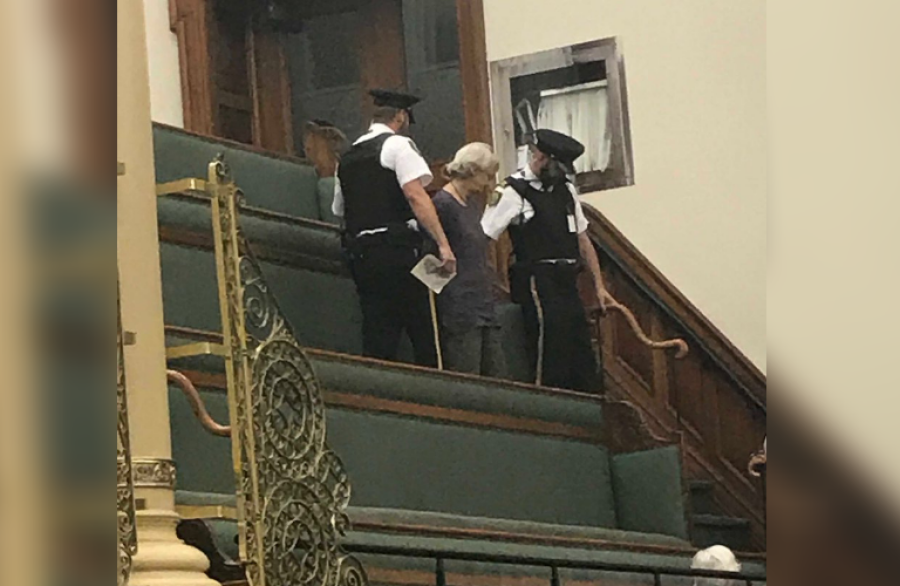On Sept. 12, Toronto resident Sally McLean headed to the Ontario legislature to watch Premier Doug Ford’s Progressive Conservatives try to pass Bill 31, which would cut the size of Toronto council almost in half.
This bill was introduced after an Ontario Superior Court Justice ruled a previous version violated certain rights under the Canadian Charter of Rights and Freedoms. In response, the Ford government invoked Section 33, a rarely-used part of the charter also known as the notwithstanding clause, so they could pass the legislation.
You may unsubscribe from any of our newsletters at any time.
When the speaker of the Legislative Assembly ordered the public gallery cleared on Sept. 12 because some observers were voicing their opposition to this decision by yelling and coughing loudly at strategic moments, McLean, 73, took a stand and refused to leave. She and one other person were handcuffed by security and taken away.
She talks to the Observer about her reasons for this act of civil disobedience, as well as the responsibility she feels as a person of privilege and offers advice to others who wish to resist in this way.

Q: Why did you decide to go to Queen’s Park that day?
A: This latest move by the premier – invoking the notwithstanding clause to erase a judicial ruling that his legislation was unconstitutional – this move touched a nerve. I was simultaneously frightened and enraged, contemplating the possibilities ahead of us in the next few years under this premier. I wanted to go to Queen’s Park to see how this unprecedented move was going to play out.
Q: Why did you refuse to leave the public gallery when you were asked to do so?
I had been in my seat for about five minutes and the gallery was only about one-quarter filled when a number of spectators raised a ruckus. I decided not to take that tack, preferring to stay quiet and bear witness. However, the speaker’s reaction was to clear the entire gallery and rule that it would remain closed for the day. I was furious, for myself and for the hundreds of people lined up around the legislature hoping to attend the session. And so, I quite suddenly decided – nope, I’m staying. First, the security people, and then the sergeant-at-arms herself came up to tell me that I would be arrested, handcuffed with my hands behind my back, escorted out of the chamber, and handed to the Toronto police. I thought it over and said – yes, I guess you’ll have to do that. I’m just not leaving.
Q: Did your age and gender play a role in your decision making?
Yes. I knew I was unlikely to suffer for this action. I had no idea what to expect but I didn’t think I’d be harmed or held for too long. I had cleared my day and figured I could do it. I know that I have privilege as an older white woman. Listening to anti-racist and social justice activists has made me aware that we can use our own privilege to put our bodies and our voices out there when it might not be safe for others to do the same. This opportunity to do just that presented itself and I decided to take it.
I realize now that the image of me in handcuffs was also powerful. I had not contemplated that the image of an older white woman would have an effect and be shared around social media. In fact, I had no idea that anyone would know about this unless I told them!
Q: Do you think now is an important time to employ civil disobedience?
A: Absolutely. We have to respond any time the powers that be overreach, and one way to do that is to stop cooperating with some of the rules. If the government is pushing through legislation that violates our rights, we have to speak up or show our dissent any way we can. This isn’t about Toronto or the size of its council. The provincial government has shown that they don’t mind trampling basic rights and freedoms. That should scare everyone in Ontario, regardless of how many councillors you think the city should have.
Q: Have you been charged with anything?
A: I’ve been charged with trespassing, as I refused an order to leave the public gallery. I’m still deciding whether to contest it.
Q: What tips can you offer to people who want to employ similar tactics? Are there specific things they should think about?
A: It is important to resist injustice, even in small ways, as long as it is safe for you to do so. So, I guess I’d also emphasize that those of us who enjoy substantial safety should step up whenever we can to speak up, amplify the voices of others and make those in power look us in the eye while they vote to take away our rights.













